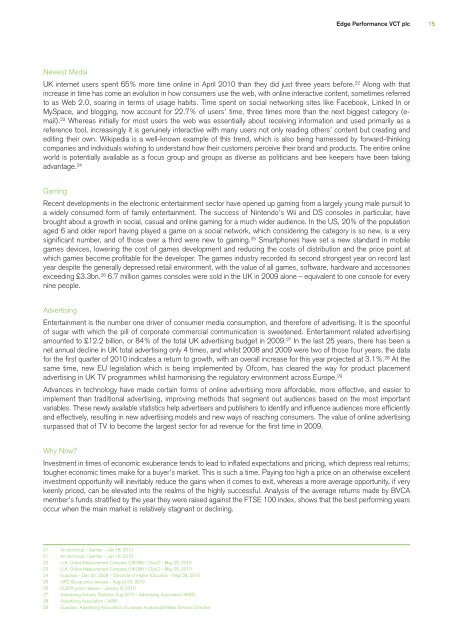EDGE_G_4 12-59-34_Layout 1 - The Tax Shelter Report
EDGE_G_4 12-59-34_Layout 1 - The Tax Shelter Report
EDGE_G_4 12-59-34_Layout 1 - The Tax Shelter Report
You also want an ePaper? Increase the reach of your titles
YUMPU automatically turns print PDFs into web optimized ePapers that Google loves.
Edge Performance VCT plc<br />
15<br />
Newest Media<br />
UK internet users spent 65% more time online in April 2010 than they did just three years before. 22 Along with that<br />
increase in time has come an evolution in how consumers use the web, with online interactive content, sometimes referred<br />
to as Web 2.0, soaring in terms of usage habits. Time spent on social networking sites like Facebook, Linked In or<br />
MySpace, and blogging, now account for 22.7% of users’ time, three times more than the next biggest category (email).<br />
23 Whereas initially for most users the web was essentially about receiving information and used primarily as a<br />
reference tool, increasingly it is genuinely interactive with many users not only reading others’ content but creating and<br />
editing their own. Wikipedia is a well-known example of this trend, which is also being harnessed by forward-thinking<br />
companies and individuals wishing to understand how their customers perceive their brand and products. <strong>The</strong> entire online<br />
world is potentially available as a focus group and groups as diverse as politicians and bee keepers have been taking<br />
advantage. 24<br />
Gaming<br />
Recent developments in the electronic entertainment sector have opened up gaming from a largely young male pursuit to<br />
a widely consumed form of family entertainment. <strong>The</strong> success of Nintendo’s Wii and DS consoles in particular, have<br />
brought about a growth in social, casual and online gaming for a much wider audience. In the US, 20% of the population<br />
aged 6 and older report having played a game on a social network, which considering the category is so new, is a very<br />
significant number, and of those over a third were new to gaming. 25 Smartphones have set a new standard in mobile<br />
games devices, lowering the cost of games development and reducing the costs of distribution and the price point at<br />
which games become profitable for the developer. <strong>The</strong> games industry recorded its second strongest year on record last<br />
year despite the generally depressed retail environment, with the value of all games, software, hardware and accessories<br />
exceeding £3.3bn. 26 6.7 million games consoles were sold in the UK in 2009 alone – equivalent to one console for every<br />
nine people.<br />
Advertising<br />
Entertainment is the number one driver of consumer media consumption, and therefore of advertising. It is the spoonful<br />
of sugar with which the pill of corporate commercial communication is sweetened. Entertainment related advertising<br />
amounted to £<strong>12</strong>.2 billion, or 84% of the total UK advertising budget in 2009. 27 In the last 25 years, there has been a<br />
net annual decline in UK total advertising only 4 times, and whilst 2008 and 2009 were two of those four years, the data<br />
for the first quarter of 2010 indicates a return to growth, with an overall increase for this year projected at 3.1%. 28 At the<br />
same time, new EU legislation which is being implemented by Ofcom, has cleared the way for product placement<br />
advertising in UK TV programmes whilst harmonising the regulatory environment across Europe. 29<br />
Advances in technology have made certain forms of online advertising more affordable, more effective, and easier to<br />
implement than traditional advertising, improving methods that segment out audiences based on the most important<br />
variables. <strong>The</strong>se newly available statistics help advertisers and publishers to identify and influence audiences more efficiently<br />
and effectively, resulting in new advertising models and new ways of reaching consumers. <strong>The</strong> value of online advertising<br />
surpassed that of TV to become the largest sector for ad revenue for the first time in 2009.<br />
Why Now?<br />
Investment in times of economic exuberance tends to lead to inflated expectations and pricing, which depress real returns;<br />
tougher economic times make for a buyer’s market. This is such a time. Paying too high a price on an otherwise excellent<br />
investment opportunity will inevitably reduce the gains when it comes to exit, whereas a more average opportunity, if very<br />
keenly priced, can be elevated into the realms of the highly successful. Analysis of the average returns made by BVCA<br />
member’s funds stratified by the year they were raised against the FTSE 100 index, shows that the best performing years<br />
occur when the main market is relatively stagnant or declining.<br />
21 Ars technical / Gartner – Jan 18, 2010<br />
21 Ars technical / Gartner – Jan 18, 2010<br />
22 U.K. Online Measurement Company (UKOM) / ClickZ – May 25, 2010<br />
23 U.K. Online Measurement Company (UKOM) / ClickZ – May 25, 2010<br />
24 Guardian – Dec 30, 2009 / Chronicle of Higher Education – May 28, 2010<br />
25 NPD Group press release – August 23, 2010<br />
26 ELSPA press release – January 6, 2010<br />
27 Advertising Industry Statistics Aug 2010 – Advertising Association/WARC<br />
28 Advertising Association / WAR<br />
29 Guardian, Advertising Association, European Audiovisual Media Services Directive
















